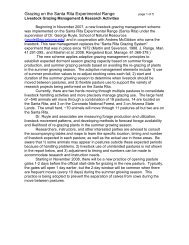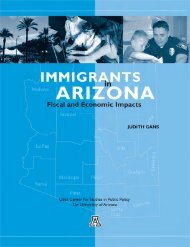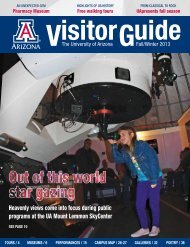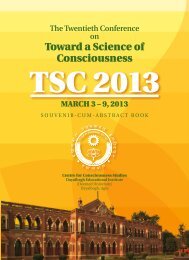CONSCIOUSNESS
Download - Center for Consciousness Studies - University of Arizona
Download - Center for Consciousness Studies - University of Arizona
- No tags were found...
You also want an ePaper? Increase the reach of your titles
YUMPU automatically turns print PDFs into web optimized ePapers that Google loves.
3. Cognitive Sciences and Psychology 119<br />
3. Cognitive Sciences and Psychology<br />
3.1 Attention<br />
153 Where Does the Mind Wander? A Quantitative Exploration of the Content of<br />
Stimulus Independent Thought Ben Baird, Jonathan Smallwood; Michael Franklin;<br />
Jonathan Schooler (Psychology, University of California, Santa<br />
Barbara, Santa Barbara, CA)<br />
While stimulus independent thought is now widely recognized to be critical to models<br />
of consciousness and cognition, the content of this endogenously generated mental activity<br />
has not yet been systematically appraised. Previous research, using methods of post-hoc<br />
experimenter classification or online self-classification, has generally limited the analysis of<br />
experience sampling reports to relatively constrained sets of pre-defined categories (i.e. on/off<br />
task, past/future thought). In this study, we sought to describe in detail the experiential content<br />
of subjects’ spontaneous thought processes. Experience sampling reports were obtained in the<br />
context of demanding and non-demanding sustained attention tasks. Using a combination of<br />
Linguistic Inquiry and Word Count (LIWC) text analysis and principal components analysis,<br />
systematic structural and cognitive patterns during on and off task thinking were identified.<br />
Our results indicate that social cognition is the central feature of stimulus independent<br />
thought. P3<br />
154 Music as Counterpoint to Epilepsy Martha Curtis <br />
(violinist; author, Pittsburgh, PA)<br />
It is our heritable power of choice that is the gift of consciousness. With epilepsy I suffered<br />
the unpredictability of horrifying temporal lobe seizures for over thirty years until a team of<br />
doctors removed my hippocampus, amygdala and half the temporal lobe of my right brain.<br />
As a professional violinist I traveled in and out of consciousness and have an experiential<br />
understanding of the efficacy of consciousness. In seizure, I went through the same affect and<br />
physical automatisms every time. It was as though a button had been pushed in my brain and<br />
the recording played my system. With my seizure videos from the brain work-up in the hospital<br />
I will demonstrate what Damasio calls “core consciousness” and “extended consciousness”<br />
with the “here and now” responses in temporal lobe seizure and the more extensive response<br />
to my surroundings with the return of the “autobiographical self”. Consciousness allows us<br />
to choose where to put our attention and, as William James wrote in the 1890s, this effort<br />
lets us “choose who we will be the next moment in a very real sense.” When I seized during<br />
Beethoven’s Emperor Concerto the brain’s inability to “know” made it impossible to even<br />
know I wasn’t playing. I knew I was back when I could hear myself say, “You can do it, Marth.<br />
I know you can do it”. With consciousness comes incredible power. Because my well-trained<br />
body knew what to do, I picked up my violin, entered the third movement and communicated<br />
the passion of Beethoven with the self I call me. I had quickly restored my humanness, including<br />
the power of intelligent choice embedded in my cells, by communicating to my soul with<br />
beauty.This presentation will include violin performance. A2<br />
155 Behavioral Indices of Mind-Wandering While Reading Michael Franklin, Jonathan<br />
Smallwood; Jonathan Schooler (Psychology, UCSB, Santa<br />
Barbara, CA)<br />
We have all had the experience of suddenly realizing that despite our best intentions,<br />
while our eyes have continued to move across the page, our minds have been somewhere<br />
else entirely. Even though mind-wandering during reading is common, researchers have only<br />
recently begun to hone in on how mind-wandering influences the processing of the words<br />
that are being read. Typically when individuals read there is a robust relationship between the<br />
lexical properties of the words (e.g. their length, familiarity, position at the end of a clause)<br />
and the amount of time that is devoted to their processing. In a recent study using an eye<br />
tracker it was found that participants’ gaze durations prior to off task reports systematically







